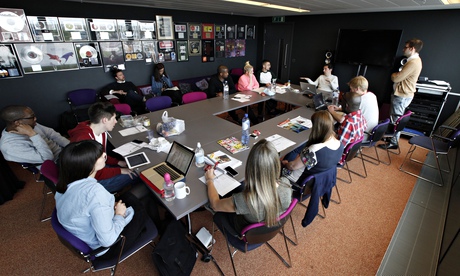
Later this week the boss of a large media organisation will announce some redundancies. I don’t know which boss or which organisation. It’s simply a given as everyone adjusts to a small-portions world. It will cause heartache for the people concerned. What it won’t do is trigger a wider debate about culture and civilisation, such as the debates which surround any reduction in the BBC’s staff and services.
These arguments resurfaced recently as Radio 1 and 1Xtra shed some shows and then the BBC announced it was losing a further 65 radio posts and reorganising its services around two “hubs”. Would this affect diversity? Would it affect the “in new music we trust” agenda? Is this salami-slicing going to cut into the heart? Here Tony Hall’s job is a lot more difficult than those of his fellow moguls.
There’s little chance of a radio service in the commercial sector making 65 people redundant, because few of them would employ that many programme people in the first place. If anyone in independent radio was listening to the Radio 1Xtra programme I heard recently where one of the two presenters asked listeners to phone in and “one of my people will get back to you”, eyebrows would have gone sharply north. In commercial radio there are no people, often literally. BBC management must rue the decision to open a big, transparent, new HQ where you can’t help notice just how many they have.
It’s not that those people aren’t busy. It’s a question of what they’re busy with, particularly in their music output. The adding of digital services like 6 Music and 1Xtra, the demands of multi-platform, the exponential genre creep where you have to be seen to have a specialist programme dealing with every last musical subdivision – all mean that the BBC’s music services now employ more people to reach fewer listeners than before.
In the broadcasting week that started on Saturday, BBC music radio has got programmes marking the centenary of Woody Guthrie, Gruff Rhys of Super Furry Animals talking about South America, Craig Charles broadcasting from Liverpool, Tom Robinson talking to T-Bone Burnett, Johnnie Walker talking to Jimmy Page, Chrissie Hynde talking to John McEnroe, James playing songs chosen by listeners, Don Letts talking about Curtis Mayfield’s first solo album, Russell Davies talking to Engelbert Humperdinck and Radcliffe and Maconie speaking to the guy out of Eels. That takes us up to Monday.
Now you could argue that this kind of range is what makes the BBC unique. You could equally argue it’s a schedule made up of nice-to-haves rather than must-haves. Each of those programmes will be pleasing to a small but important constituency. But isn’t that what the internet is for? People’s media habits are going through massive disruption and it’s more important to deal with the new ones than try to shore up the old ones.
Each of the programmes mentioned above has to be planned, produced, engineered, sometimes scripted (particularly if the presenter is not a radio person) and, thanks to recent problems, “complied”. This last has added more work. One Radio 2 producer complained to me that a senior executive now has to listen to every two-hour recording made by the reliably inoffensive Dale Winton before it can be passed for broadcast. All this takes time and it has to be done.
In the BBC everything’s a scandal waiting to happen, a storm of righteous indignation waiting to be whipped up; looked at from the other side any proposed change is a pillar of civilisation that has to be defended. There’s now a proven way to do that: keep calm and pretend you’re sacred.
When the last storm blew up around the proposal to close 6 Music, a senior figure in the corporation confided to me that it was obvious it should be closed. He was sympathetic but said its costs simply couldn’t be justified. He also predicted that the management wouldn’t have the nerve to close it in the face of protests. He was right. He further predicted that they would have to make lots of stealthy cuts instead. It appears he was right about that as well.
The 6 Music closure won’t be revisited. The memory of it haunts the corporation and makes it likely that it won’t dare sack another service. It won’t interfere with local radio because of opposition from politicians who like being on it. It can’t interfere with Radio 3 because that would be cultural vandalism. Any sane person knows that whatever the future holds for the BBC it won’t be gung-ho expansion. That is the case whether you side with the “Auntie right or wrong” tendency or the corporation’s sworn enemies. If you won’t let them lose a limb then you mustn’t complain if they lose some weight.

